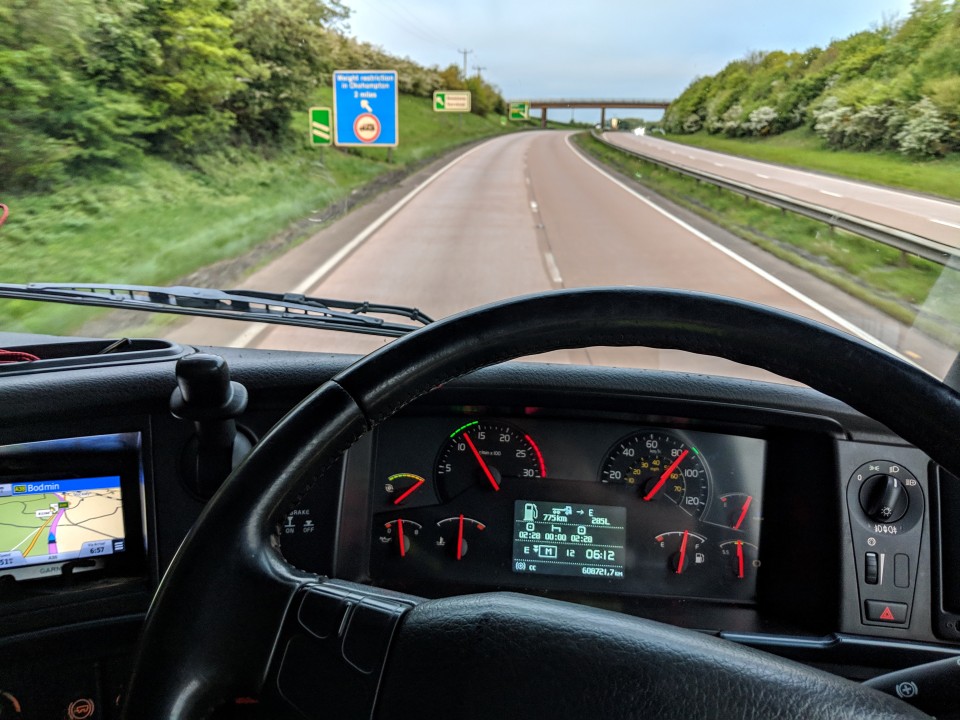
Susie Jones
Vous vous ennuyez sur la route ?
Créée: 27/08/2024
•
Mise à jour : 27/08/2024
Le conducteur de camion moyen passe environ 12 heures au volant chaque jour. Passer un temps infini sur la route peut sembler attrayant, mais la réalité est tout autre. Les innombrables stations-service et aires de repos, ainsi que les longues heures de travail, peuvent devenir fastidieuses. Les camionneurs passent souvent leur temps libre loin de chez eux et il peut être difficile d'éviter l'ennui.
Selon une récente enquête de Convoy, l'ennui est l'un des principaux défis auxquels sont confrontés les chauffeurs routiers. Quel est l'effet de l'ennui sur le bien-être des conducteurs ? Et comment les routiers peuvent-ils se divertir ?
Comment l'ennui affecte le bien-être des conducteurs
La fatigue, l'isolement, la solitude et le manque de stimulation mentale sont des préoccupations communes aux conducteurs. Certains d'entre eux peuvent faire face à ces problèmes par des mécanismes d'adaptation malsains, tels que la suralimentation, le tabagisme ou la consommation excessive de caféine. Au fil du temps, ces habitudes peuvent avoir un impact négatif sur la santé mentale.
Toutefois, à mesure que l'on parle de santé mentale, de plus en plus de chauffeurs adoptent une approche différente pour lutter contre ce phénomène. Nous avons demandé à des chauffeurs routiers sur Facebook ce qu'ils font lorsque l'ennui les gagne.
"Livres audio, principalement sur la psychologie. La musique, les conversations avec mes proches ou la radio. Ou bien j'éteins tout et je mène une existence paisible avec mes propres pensées", explique Nigel.
D'autres ont indiqué que le fait de parler à leurs proches par téléphone les avait aidés. Ashleigh déclare :
"Parler à mes amis dans un groupe de discussion. Honnêtement, si je ne les avais pas eus, j'aurais arrêté depuis longtemps. La route est semée d'embûches et sans parler à de très bons amis, je n'aurais jamais survécu.
De même, Karl estime qu'une "discussion de groupe avec des amis est indispensable".

Prévenir l'ennui au volant
Contrairement aux idées reçues, le transport routier est une activité physique : les conducteurs ont besoin de coordination et de concentration pour éviter les accidents. Malgré cela, le fait d'être au volant pendant de longues périodes peut entraîner de la fatigue. Le risque de se reposer sur ses lauriers peut survenir, surtout si le conducteur connaît bien son itinéraire. Comment les conducteurs peuvent-ils gérer la complaisance au volant ?
Qu'il s'agisse d'écouter un podcast ou une chanson entraînante, les conducteurs doivent choisir quelque chose qui leur permette de garder l'esprit alerte. Nous avons dressé une liste de choses à faire pour éviter de s'ennuyer au volant.
Podcasts : Marty, chauffeur routier, écoute "des dizaines de podcasts" pendant qu'il conduit. Les podcasts sont un excellent moyen de changer les choses et d'apprendre quelque chose de nouveau. Consultez cette [liste utile de podcasts sur le transport routier] (https://www.alltruckjobs.com/blog/trucking-podcasts-better-radio/)
Musique : "De la musique, de la musique et encore de la musique", c'est la devise de Richard pour lutter contre l'ennui. Qu'il s'agisse d'écouter la radio ou de chanter sur une playlist, la musique est un excellent moyen de garder l'esprit alerte
Faites une pause : Bien que les conducteurs soient soumis à des délais stricts et aux réglementations du tachygraphe, sortir de la cabine lorsque l'ennui se fait sentir permet de se recentrer.
Ennui pendant les temps morts
Les camionneurs sont confrontés à des défis supplémentaires pour se divertir après leur travail. Il est impératif d'adopter une approche proactive pour éviter l'ennui pendant cette période. Nous avons compilé une liste de moyens de passer les heures.
Emplacement : Les relais routiers qui offrent une vaste gamme d'installations et une ambiance communautaire sont un excellent moyen d'atténuer l'ennui. Certaines font office de centre social où les camionneurs peuvent partager des expériences similaires. Rendez-vous sur notre [page des emplacements] (https://www.snapacc.com/locations/?lang=EN) pour découvrir les installations proposées par nos partenaires de service SNAP.
Faire de l'exercice : Faire une promenade quotidienne ou faire preuve de créativité dans vos entraînements permet d'éviter l'ennui et de rester en forme et en bonne santé. Consultez nos conseils pour rester en bonne santé sur la route
Services de streaming : Rattraper la dernière émission de télévision ou parcourir les médias sociaux. Steve, chauffeur routier, aime "faire défiler et commenter Facebook et regarder Netflix" pour passer le temps.
Passe-temps : Les possibilités sont infinies. Apprendre un instrument, une langue étrangère, dessiner, écrire, etc. S'adonner à un passe-temps est un moyen efficace d'éviter l'ennui
La cuisine : Cuisiner dans la cabine présente de nombreux avantages. Non seulement cela évite de s'ennuyer, mais cela permet aussi d'économiser de l'argent et d'être plus sain
Restez en contact avec vos proches : Le temps d'arrêt d'un camionneur est l'occasion idéale de contacter ses proches. Les appels vidéo sont un moyen efficace de se rapprocher de sa famille et de ses amis
Détendez-vous : les camionneurs peuvent être confrontés à des situations stressantes. Se détendre pleinement après une journée de travail peut améliorer le bien-être du conducteur. Les techniques de relaxation telles que les exercices de respiration profonde et la méditation réduisent le stress.
Bien que certains conducteurs apprécient la solitude et l'indépendance qu'offre la route, lutter contre l'ennui reste un défi pour beaucoup d'entre eux. En raison de la nature de leur travail, les routiers connaissent souvent de longues périodes d'ennui. Cependant, pour améliorer leur bien-être, leur satisfaction au travail et la sécurité routière, ils doivent trouver des moyens de l'atténuer. Qu'il s'agisse de se concentrer sur la tâche à accomplir, d'écouter la radio ou de discuter avec des amis ou des membres de la famille, la plupart des camionneurs peuvent trouver une solution qui leur convient.

Où dorment les chauffeurs routiers ?
La plupart des conducteurs dorment dans leur cabine, car elle est bien équipée pour une nuit de sommeil confortable. Une cabine couchette de base comprend un lit, des rangements, des lumières et des prises électriques, ce qui en fait un véritable foyer.
En raison de la pénurie actuelle de places de stationnement en Europe, de nombreux automobilistes se garent sur des aires de stationnement. Cette pratique est jugée dangereuse et rend le conducteur vulnérable au vol. Depuis novembre 2017, les conducteurs de poids lourds au Royaume-Uni doivent prendre des pauses hebdomadaires régulières dans des aires de repos appropriées (comme les aires de service et les relais routiers).
Le système [SNAP's Depot Parking] (https://snapacc.com/depot-parking) permet aux flottes d'offrir leurs places de parking pour camions au réseau, ce qui atténue la pénurie et aide les chauffeurs à éviter les situations vulnérables. En outre, SNAP met à la disposition des conducteurs plus de 450 partenaires de service dans toute l'Europe. Rendez-vous sur notre [page des cartes] (https://snapacc.com/map/) pour en savoir plus.
Pourquoi les chauffeurs de camion laissent-ils les portes de leur remorque ouvertes ?
Si vous avez déjà conduit sur une route principale la nuit, vous avez peut-être remarqué des camions garés avec la porte de leur remorque ouverte. De nombreux conducteurs agissent ainsi pour dissuader les voleurs, partant du principe que si la porte de la remorque est ouverte, il n'y a rien à voler. Cette pratique est surtout utilisée sur les remorques à rideaux, car elle empêche les voleurs de couper le rideau pour voir ce qu'il y a à l'intérieur.



